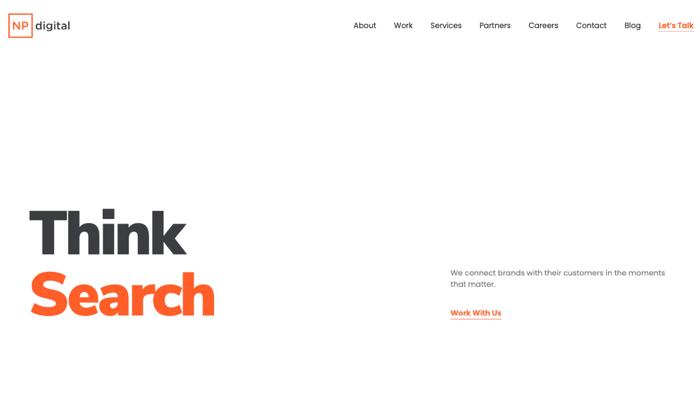
Statista says 52 percent of global internet traffic is mobile. A third of all mobile searches on Google are local. Microsoft says the same thing — 53 percent of mobile searches on Bing have local intent.
This is pretty big on its own.
Then we see data showing that local searches are growing 50 percent faster than mobile search. This growth is amazing for local businesses, but many companies aren’t prepared to take advantage of this growth. If you have the right local SEO agency, that’s not a problem.
Do you know how to choose the right agency?
Here are some simple tips you can use to help you choose the right local search agency for your business.
Know Your Goals and Desired Outcomes for Local SEO
According to a BrightLocal survey, the top local search metrics for businesses were:
- Google rankings: The better your rankings, the more traffic you generate for your business. It’s easier to generate leads, inquiries, or sales if you have strong rankings in both organic search and Google Maps via their local pack.
- New customers: Local businesses obviously need customers; that’s not the problem here. It’s the fact that local companies have a huge amount of competition for a limited set of customers in their area. They need to dominate local search if they want to close new customers consistently.
- New leads/inquiries: Leads give local businesses breathing room. If you have good lead flow, you’ll be able to increase your prices, test new products and services, and identify which offers work best for you. This makes cash flow more predictable once you’ve dialed your conversion rate in.
- Organic traffic: This includes traffic from your search engine rankings, online reviews, direct visits, and other earned sources.
- Number of new reviews: With “near me” searches, a review rating increase of 0.1 could boost your conversion rates by 25 percent. Great reviews make everything better. Your conversion rates are higher, advertising is cheaper, and your return on marketing investment is better.
The thing about these metrics is they’re all pretty practical; local businesses need consistent cash flow. Each of these five metrics has a direct impact on a local business’ revenue. If you’re hiring a local SEO agency, they should place special emphasis on the metrics that impact your revenue directly.
Next, focus on metrics that are specific to your business.
If you’re running a restaurant, for example, you may want to pay attention to your customer acquisition costs, repeat visits, customer retention, and the offers that brought customers back. Focus on your core metrics, then add additional metrics when you need more data.
7 Characteristics of a Great Local SEO Agency
There are more than 8,212 local SEO agencies listed on Clutch.co. If you’re not sure what you’re looking for, most of these firms look great. You’ll see glowing reviews on most agency profiles, clear pricing data, and information on their service focus.
None of that tells you if these agencies are right for you.
Here’s a list of characteristics you should watch for. Use these to decide whether the agencies on your list are a good fit for your local business (or not).
1. Agency focus
There are two ways to look at this. You can look for agencies with a service focus that’s almost entirely SEO focused, or you can look for a full-service agency with experience in several different areas.
- Specialist focus: You can choose an agency that’s focused exclusively on local search. A specialist agency focuses on the services that are closely related to local search but they
- Generalist focus: These agencies offer a variety of services, and they’re focused on higher-level goals across a lot of different channels.
Here are the pros and cons of both.
If you work with a local SEO specialist, they probably won’t be able to guide you with your other campaign goals. If you’re wondering how you can integrate local search with your other marketing campaigns, a specialist may not be able to provide you with the advice you need.
A specialist will be able to come up with creative (and profitable) strategies in your local search campaigns. If you have the expertise or help you need to manage the other parts of your online marketing, this makes sense. If you need help with other areas and you have a limited budget, this probably isn’t a good idea.
Generalists can provide you with a comprehensive look at the performance of your campaigns overall. They’ll be able to tie your local SEO campaigns to other channels like social media, email, direct response, or advertising. An established agency will have the skills and the team you need to create content that improves your local SEO campaign performance.
2. Deep industry expertise
If you’re looking for something specific, your local SEO agency should be able to provide you with the services you’re looking for. If you’re a local restaurant, you’ll want to choose an agency that has experience working with restaurants. If you’re focused on B2B sales, you’ll want a B2B specialist.
They need an in-depth understanding of your business.
If they have a good reputation, they’re willing to put in the work, and you’re eager to work with them, an inexperienced agency can work. As much as possible, you want to work with an agency that understands your business well.
Case studies, work samples, anonymized data, reviews, and reports are all helpful ways to measure their skill and performance.
3. They practice what they preach
When you’re looking for a local SEO agency, you want to find one that ranks well for a decent amount of keywords. If they don’t rank well for any keywords and they’re not present in local or organic search, they’re probably not good at SEO.
You’ll want to find this out ahead of time.
You can use Ubersuggest to analyze their rankings. This will give you a pretty good idea of their skills; it’ll also show you whether the agencies you’re considering practice what they preach. Some agencies neglect their websites, preferring to focus on client work instead. No problem, just ask them to show you what they’ve been able to do for other clients. They should be able to provide you with at least one recent (and detailed) example of a client they were able to help.
If they can’t give that info, they’re probably not a good fit for your business.
4. A strong reputation
Your agency should have an established list of clients and case studies. They should be able to provide you with references and work samples if requested. You should be able to find online reviews from previous clients. They should also be able to show you that they have the skills to handle outreach and partnerships. They should also have a demonstrated ability to place content with local or regional journalists and publications to help promote your content.
It’s a red flag if agencies can’t provide you with any of the information above. It’s also a bad sign if there’s a lot of negative feedback about their agency online.
5. Experienced SEOs
According to BrightLocal’s survey, 38 percent of businesses only have one SEO professional on staff. Only 10 percent of companies have more than 10 SEOs. Most local SEO agencies and SEOs work alone, so you’ll want to make sure that your agency has experienced SEOs on staff.
Before you hire your agency, you’ll need to know that your agency has an appropriate number of people who are experienced and able to manage your account properly. If you’re uncomfortable with most of the work on your account being done by interns or freelancers, you may need to be more careful in your search.
6. Up-to-date education and training
In 2018, Google rolled out 3,200 changes to its search algorithm, up from just 400 changes in 2010. Search is always changing. If you’re planning on hiring a local search agency, you’ll need someone who can stay on top of these changes or respond on your behalf if something goes wrong.
After a minor update in 2019, many sites using good SEO practices were actually penalized. Google declined to clarify what changed, when it happened, or how to adjust.
“Some have asked if we had an update to Google Search last week. We did, actually several updates, just as we have several updates in any given week on a regular basis. In this thread, a reminder of when and why we give specific guidance about particular updates….”
— Google SearchLiaison (@searchliaison) November 12, 2019
When it comes to situations like these, most local businesses are in over their heads. They’re not particularly sure how to address the problem or even where they should start. Your local SEO agency should know how to deal with these situations. They should have procedures in place to help you address any issues that come from an algorithmic update.
7. Offering clear communication and managing expectations
A reputable local SEO agency isn’t going to promise you #1 rankings. They know businesses with large budgets are fighting for the same keywords you are. If you’re going to take the top spot in Google, it’ll take a lot of time, work, and resources.
Rankings shouldn’t really be the priority though.
Your agency should be focused on increasing conversions and revenue for your business. They should be able to provide you with consistent performance improvements over time. If they’re focused on vanity metrics, they may not be a good fit for your business.
They’ll address any unrealistic expectations you have ahead of time. They’ll make reasonable projections, and they’ll explain the reasoning behind their numbers.
How to Work with a Local SEO Agency
You’ll want to set your agency up with the things they need to work with you. Here’s a shortlist outlining the things you should provide your agency with.
- Usernames and passwords: You’ll want to provide your agency access to analysis tools — Google Analytics, Search Console, GMB, etc. This helps your agency establish benchmarks for your campaign.
- Performance data: You’ll want to give your agency access to any performance data you may have in other sources (e.g., spreadsheets, Ubersuggest, Authority Labs, Moz, etc.). This will help your agency identify any problems before you start your campaign.
- Marketing content: Give your agency access to your marketing content ahead of time, so they’re able to match your voice, brand guidelines, and approach.
- Product or service information: Provide your agency with as much information on your products and services as you can. A good agency will learn as much as they can about what you offer. Great agencies will understand your product as well as some of your veteran employees.
- Legal content: These are the list of rules you’ve set with your attorneys ahead of time — your terms of use, privacy policy, return/exchange policies, warranty and guarantee information, and intellectual property details.
What about your relationship with your agency? To keep your relationship healthy, you’ll want to:
- Choose a point-of-contact: You’ll need to provide your agency with a consistent point-of-contact. They should have decision making power or the ability to get feedback from someone who does. If you’re the owner of a small local business, you may be the point-of-contact.
- Outline your approval process: If you’re assigning an employee as your point-of-contact, you’ll want to outline the approval process your agency should follow. Does your point-of-contact have the authority to make all decisions on your behalf? What’s the approval process your agency needs to follow to make major changes in your campaign or project? Spell it out, so everyone is on the same page.
- Spell out your expectations: If you know the breakeven costs for product or service? The most you can spend to attract a new customer? Share this data with your agency. Let them know that you need specific results to continue the relationship. These shouldn’t be extreme or unrealistic. They should be based on the numbers or existing performance data you have for your business.
- Set communication standards: What’s the best way for agencies to communicate with you? How often would you like to have meetings with your agency? You’ll need to figure this out at the beginning of the relationship. Choose a sweet spot that gives your agency the time they need to work and produce results.
Give your agency the feedback, information, resources, and support they need to achieve the results you want. Be as open and transparent with them as you can so they’re able to work hard for you.
How to Find the Right Local SEO Agency For You
You can use review aggregators like Clutch.co, HubSpot Agency Directory, Sortlist, or TopSEOs to find the local SEO agency that’s best for you. We’ve created a helpful shortlist of some of the best local SEO agencies in the industry.
7 of the Best Local SEO companies
1. NP Digital – Best for Conversion-Driven Local SEO

My agency, NP Digital, focuses on conversions and revenue. Clients have high expectations due to my reputation, but our case studies show we’re able to deliver amazing results. We have a 4.3 – 5-star rating online, and we’ve been able to provide consistent results for each of our clients. In one case study, we were able to grow our client’s organic traffic by 2.3x!
2. Searchbloom – Best for Local (Technical) SEO
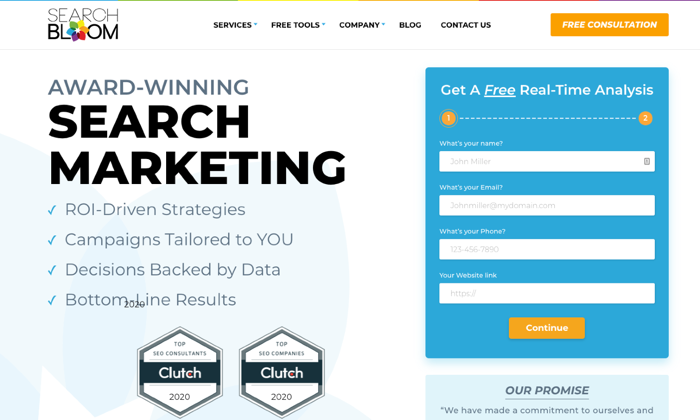
Searchbloom relies on its A.R.T (Authority, Relevancy, Technology) methodology to drive local SEO results. Searchbloom is really effective at technical SEO, which is due to the fact that they’re focused first on optimizing their client’s technology stack.
3. BrightLocal – Best for Assessing Local Search Performance
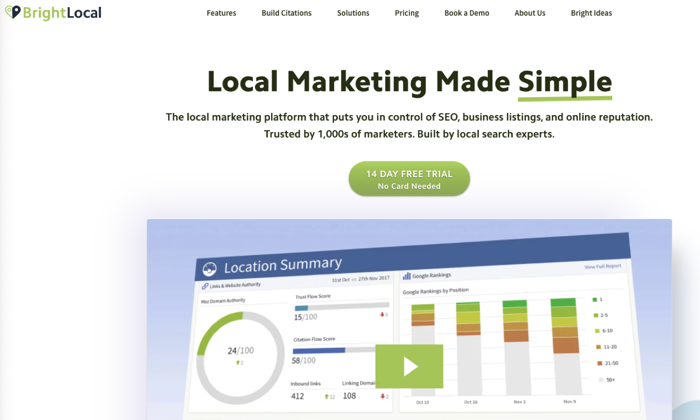
BrightLocal makes all-in-one local marketing software for agencies and local businesses. They also offer services — manual submission, citation building, and management services for your local SEO campaigns. If you’re looking for an agency to help in a supporting role, BrightLocal is a great option. If you’re looking for the kind of comprehensive help you’d receive at a traditional digital marketing agency, BrightLocal is probably not what you’re looking for.
4. Digital Marketing Agency – Best for Worldwide Local Search
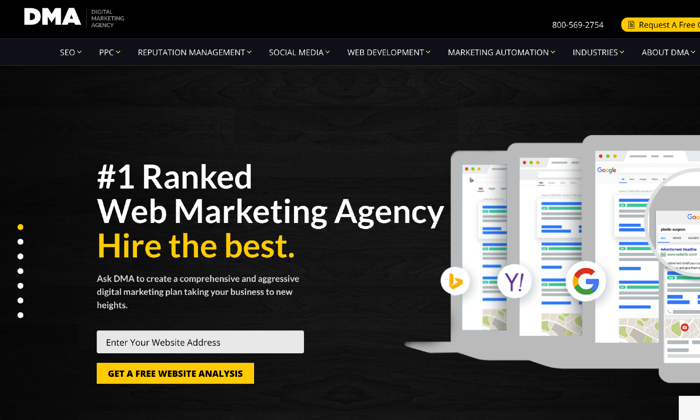
DMA excels at handling large, multi-national accounts for established medium-sized or blue-chip clients. They provide clients with end-to-end local search campaign management across a range of markets, including markets with different languages, cultures, and expectations.
5. HigherVisibility – Best for Franchise / Multi-Location
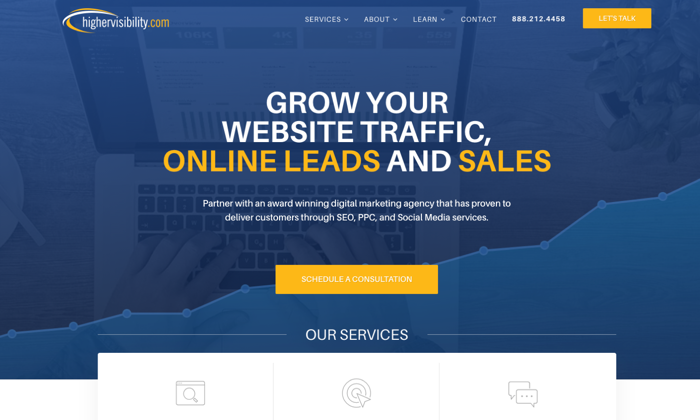
HigherVisibility is an agency that specializes in organic search engine optimization and local SEO. They’re especially good at local SEO for small businesses, franchises, and multi-location companies. The majority of their clients are small, local business owners who need more traffic, leads, and sales.
6. Instaboost Media – Best for Low Budgets
Instaboost Media works with tiny budgets. They’re perfect for local mom and pops businesses that don’t have the budget for large local search campaigns. They specialize in two specific areas, paid ads (e.g., Google ads, Facebook ads, Bing ads, etc.) and local SEO. They’re able to multiply tiny budgets, creating revenue for cash strapped locals.
Conclusion
Mobile search is growing, half of all global internet traffic is now mobile. Local searches are growing 50 percent faster than mobile. This growth is a huge opportunity for local businesses if they’re ready to take advantage of this huge opportunity.
When it comes to local search, most local businesses are in over their heads. With the right agency and helpful guidelines, you’ll be prepared to take advantage of the local search boom.
Use these simple tips to find, vet, and hire the right local SEO agency for your business.
The post How to Choose The Right Local SEO Agency appeared first on Neil Patel.
from Blog – Neil Patel https://ift.tt/3m1gLKo

No comments:
Post a Comment